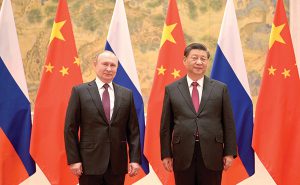Bloomberg
Vladimir Putin and Xi Jinping closed ranks against the US and its allies on key security issues as they declared that there’s no limit and “no forbidden zones†in the friendship between Russia and China.
At their first in-person meeting in more than two years Friday, Putin and Xi said in a joint statement that China “treats with understanding and supports†Russia’s demand for binding security guarantees from the US and Natoin the standoff over Ukraine, and backs Moscow in opposing expansion of the Western military alliance.
Russia endorsed China’s policy on Taiwan, saying it opposed Taiwanese independence “in any form.†The two powers also said they were “seriously concerned†about the AUKUS security partnership formed by the US, Australia and the UK, warning of the risk of an arms race in the Asia-Pacific region.
The summit meeting lasting almost four hours in Beijing was a conveniently timed show of solidarity on the sidelines of the Winter Olympics and the Russian leader used the occasion to court his increasingly powerful neighbor to help offset the US’s alliance network. The 38th one-on-one exchange between the two long-tenured authoritarian leaders took place amid U.S. and European warnings of punishing sanctions if Russia invades neighboring Ukraine, something Moscow insists it isn’t planning to do.
With growing political, military and economic frictions between China and the US, both Moscow and Beijing see an advantage in drawing closer together on the world stage.
Putin is easily the most high-profile among the 21 world leaders attending the opening ceremony of the Winter Games, with Australia, Canada and the UK joining the US’s “diplomatic boycott†over China’s human rights record. Beijing has repeatedly accused Washington of seeking to politicize the global sporting event, while using Putin’s visit to tout closer ties with Moscow.
“The speed and scale of their rapprochement is accelerating,†said Alexander Gabuev, head of the Carnegie Moscow Center’s Russia in the Asia-Pacific program, before the summit took place.
In a statement laced with criticism of US policies and actions, Putin and Xi declared a “new type†of relations between Russia and China that they said was superior to military-political alliances of the Cold War era. Their deepening ties represent a strategic challenge for US President Joe Biden, who’s sought to focus his administration on the geopolitical contest with China even as Putin repeatedly forces him to devote time and resources to Russia.
Although China hasn’t recognized Putin’s 2014 annexation of Crimea and has urged all sides to show restraint in the present crisis over Ukraine, Foreign Minister Wang Yi told US Secretary of State Antony Blinken in a phone call last week that Russia’s “legitimate security concerns should be taken seriously and addressed.â€
Russia’s gas giant Gazprom PJSC signed a deal with China National Petroleum Corp. to increase supplies to the nation, the world’s largest energy consumer. Putin told Xi the agreement would “supply 10 billion cubic meters a year of gas to China†via a new route from the Far East. Separately, Russia’s biggest oil producer Rosneft PJSC has reached an agreement with CNPC as well to deliver 100 million tons of crude oil via Kazakhstan within 10 years.
China is already Russia’s largest trading partner and trade jumped by one-third to a record $140 billion last year, driven by rising energy consumption and commodity prices.
 The Gulf Time Newspaper One of the finest business newspapers in the UAE brought to you by our professional writers and editors.
The Gulf Time Newspaper One of the finest business newspapers in the UAE brought to you by our professional writers and editors.
